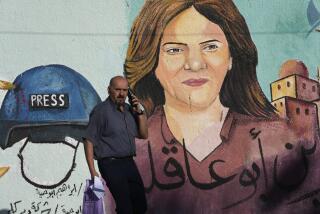Telling Libya’s story over the Internet
- Share via
Reporting from Umm Saad, Libya — Suleiman Zjailil is a modern-day town crier. He spends his days driving his battered car back and forth across the border with Egypt, smuggling out grainy cellphone videos so the world can see the news from his quarantined land.
Zjailil, an engineer in the Libyan coastal city of Tobruk, is determined to deliver visual proof of President Moammar Kadafi’s bloody tactics against a mounting populist rebellion.
Armed only with thumb drives and CDs, he downloads videos taken by Libyans and makes the 95-mile trip from Tobruk to Egypt.
“I don’t even know how to fire a gun, but I have the most powerful weapon of all: the media,” Zjailil said Friday as he rested with a glass of hot sweet tea after another punishing trip.
For the last week, an ad hoc network of smugglers such as Zjailil has been delivering videos and word-of-mouth accounts of protests, chaos and killings in Libya.
Zjailil said the get-out-the-message effort began haphazardly as Libyans seeking to depose Kadafi quickly realized that tumultuous events weren’t being relayed beyond the borders of this vast desert nation.
“No one called a meeting and said, ‘We need to do this,’ ” Zjailil said. “Everyone had the same idea. Every day, I meet someone new at the border who is bringing more videos.”
Even as international journalists are flowing into Libya through the open border crossing here, the demand for accurate and verifiable information from Libya remains acute. Zjailil says he is enhancing the efforts of professional journalists, not usurping them.
“I’m an engineer, not a journalist,” he said. “I’m just a patriotic man who wants the world to know exactly what this crazy man Kadafi is doing to my country.”
Zjailil, a middle-aged man dressed in a shiny blue tracksuit, had dark circles under his eyes and yawned constantly. He said he had not slept much since the revolt against Kadafi erupted.
He seemed driven by his task. It requires boldness, guile and a working knowledge of the Internet. It also helps, he said, to nurture good relations with Egyptian security officers who let him pass through the clogged border post.
Because the Libyan regime has severely restricted access to the Internet, the smugglers use Egypt to post videos on Libyan-centered Facebook pages and to television websites, particularly that of Qatar-based Al Jazeera.
Some of the videos show Kadafi’s militiamen and African mercenaries firing at protesters last week in eastern parts of the country, where the rebellion has wrested control from the regime. Others show disheveled and frightened mercenaries captured by protesters or by police and army units that have defected to the resistance. Still others depict wild celebrations by Libyans.
Even as news fragments pour east into Egypt, aid and messages of support are surging west into Libya. The border crossing is jammed with vehicles lined up to deliver food, medicine, blood and other supplies.
Bedouins and others along the border are relying on social media to rally and chronicle support and assistance for the rebellion and civilians caught in the chaos.
Aymann Shweky, 40, a gaunt Bedouin with a clipped silver beard, uses Twitter to share news of events in Libya and to report on aid efforts.
Before the rebellion erupted, Shweky said, he had cranked out 28,000 Twitter posts on Egyptian politics. But now he is focused on Libya.
He informed his 2,000 Twitter followers Friday of 200 cars passing into Libya carrying food and supplies donated mostly by fellow Bedouins along the desert coast. Another tweet described 700 liters of donated blood heading west.
“It’s our duty to help them,” Shweky said.
Zjailil said the defining purpose of his video-smuggling efforts is to expose and publicize the killings by Libyan soldiers and militias, and especially the mercenaries.
“If you want to enrage a Libyan, just bring in a foreigner against him,” Zjailil said.
With his latest batch of videos uploaded and delivered to the world, Zjailil made preparations for the long drive back to Tobruk to collect more news.
“The story,’ he said wearily, “is not over.”
More to Read
Sign up for Essential California
The most important California stories and recommendations in your inbox every morning.
You may occasionally receive promotional content from the Los Angeles Times.











